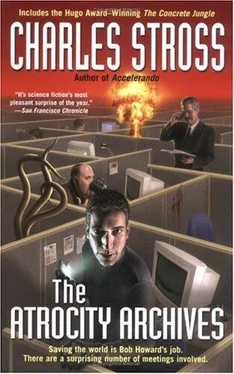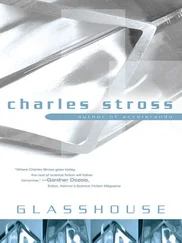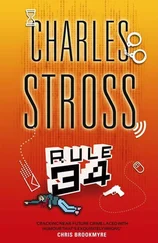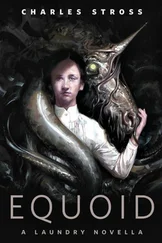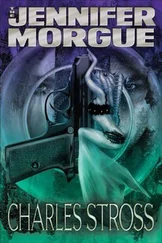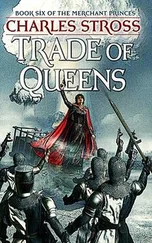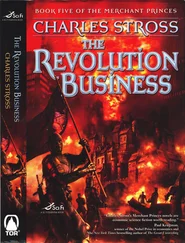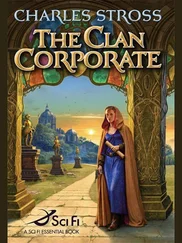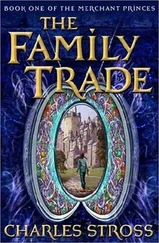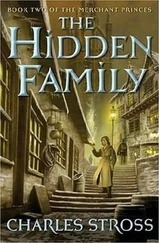Charles Stross - The Atrocity Archives
Здесь есть возможность читать онлайн «Charles Stross - The Atrocity Archives» весь текст электронной книги совершенно бесплатно (целиком полную версию без сокращений). В некоторых случаях можно слушать аудио, скачать через торрент в формате fb2 и присутствует краткое содержание. Жанр: Киберпанк, на английском языке. Описание произведения, (предисловие) а так же отзывы посетителей доступны на портале библиотеки ЛибКат.
- Название:The Atrocity Archives
- Автор:
- Жанр:
- Год:неизвестен
- ISBN:нет данных
- Рейтинг книги:3 / 5. Голосов: 1
-
Избранное:Добавить в избранное
- Отзывы:
-
Ваша оценка:
- 60
- 1
- 2
- 3
- 4
- 5
The Atrocity Archives: краткое содержание, описание и аннотация
Предлагаем к чтению аннотацию, описание, краткое содержание или предисловие (зависит от того, что написал сам автор книги «The Atrocity Archives»). Если вы не нашли необходимую информацию о книге — напишите в комментариях, мы постараемся отыскать её.
The Atrocity Archives — читать онлайн бесплатно полную книгу (весь текст) целиком
Ниже представлен текст книги, разбитый по страницам. Система сохранения места последней прочитанной страницы, позволяет с удобством читать онлайн бесплатно книгу «The Atrocity Archives», без необходимости каждый раз заново искать на чём Вы остановились. Поставьте закладку, и сможете в любой момент перейти на страницу, на которой закончили чтение.
Интервал:
Закладка:
Spy fiction, like horror fiction, relies on the mundanity of the protagonist to draw the reader into proximity with the unnatural and occult horrors of alienation. We are invited to identify with the likes of Harry Palmer (as Deighton named him in the film of The Ipcress File -significantly, he has no name in the original novel), a low-level civil servant whose occasional duties, in between filing paperwork, involve visiting nuclear test sites, shepherding weapons scientists, and hunting agents of the alien power. Slowly sucked into a ghastly plot by the slow revelation of occult, secret knowledge, Palmer is bewildered and confused and forced to confront his worst fears in a world that the novelist slowly discloses to be under a nightmarish threat from beyond the consensus reality imposed by our society.
We've also become blasè about the apocalyptic nightmares of an earlier age.
Howard Phillips Lovecraft was one of the great pioneers of the spy thriller. Born in 1890, in Providence, Rhode Island, he was the child of well-off parents. However, when Lovecraft was three years old, his father was institutionalized, and Lovecraft suffered a variety of psychosomatic ailments that prevented him attending school. Despite these problems he was self-educated, taking an interest in science as well as literature. After a nervous breakdown in 1908, Lovecraft lived at home with his increasingly deranged mother. Writing rapidly, he became a self-published amateur journalist, and in the late nineteen-teens began to send out his stories for publication.
Lovecraft brought a cool, analytical eye to the pursuit of espionage. In his writings we frequently encounter the archetype of the scholar as spy, digging feverishly through libraries and colossal archives in search of the lost key to the cryptic puzzle. In At the Mountains of Madness Lovecraft prefigures the late twentieth-century techno-thriller brilliantly, with his tale of highly trained agents of an imperial power infiltrating a forbidden icy continent-not a million miles from the brooding ice plateaux of Siberia-in search of secret knowledge, at peril of death at the hands of the vigilant defenders of the new order should they come to their attention. Echoes of Lovecraft's obsessions abound in the more developed thrillers of the Cold War, from Alistair MacLean's Ice Station Zebra to the fervidly luscious garden of biological horrors in Ian Fleming's You Only Live Twice (the book, not the film).
Are we confused yet? Just in case, I'll summarise. Len Deighton was not an author of spy thrillers but of horror, because all Cold War-era spy thrillers rely on the existential horror of nuclear annihilation to supply a frisson of terror that raises the stakes of the games their otherwise mundane characters play. And in contrast, H. P. Lovecraft was not an author of horror stories-or not entirely-for many of his preoccupations, from the obsessive collection of secret information to the infiltration and mapping of territories controlled by the alien, are at heart the obsessions of the thriller writer.
(Before I stretch this analogy to breaking point, I am compelled to admit that there is a difference between the function and purpose of horror and spy fiction. Horror fiction allows us to confront and sublimate our fears of an uncontrollable universe, but the threat verges on the overwhelming and may indeed carry the protagonists away. Spy fiction in contrast allows us to believe for a while that the little people can, by obtaining secret knowledge, acquire some leverage over the overwhelming threats that permeate their universe. So, although the basic dynamics of both horror and spy fiction rely on the same sense of huge, impersonal forces outside the control of the protagonists, who might initially be ignorant of them, the outcome is often different.)
The Game of Spy and Dagon
The fictional spy is very unlike the spy in real life.
Every so often, Western intelligence agencies advertise in public for recruits. The profile of the professional agent is that of a government employee: quiet, diligent, punctilious about filling out forms and obeying procedures. Far from having a mysterious past, prospective employees of secret agencies have to provide a complete and exhaustive list of everywhere they've ever lived, and their background will be picked over in detail before the appointment is approved. Far from being men of action, the majority of intelligence community staff are office workers, a narrow majority of them female, and they almost certainly never handle weapons in the line of duty.
The picture changes when you contemplate non-Western organisations such as the Iraqi Mukhabarat, agencies of states that contemplate internal subversion with the cold eye of totalitarian zeal. It changes in time of open warfare, and it changes again when you examine Western agencies concerned with counter-terrorism and organised crime duties, such as the FBI. But the key insight to bear in mind is that in reality, the James Bond of the movie series (and, to a lesser extent, Ian Fleming's original literary wishfulfillment vehicle) is an almost perfect photographic negative of the real intelligence agent. He is everything that a real spy cannot afford to be-flashy, violent, high-rolling, glamorous, the centre of attention.
So why are spies such fascinating targets of fiction?
Answer: because they know (or want to know) what's really going on.
We live in an age of uncertainty, complexity, and paranoia. Uncertainty because, for the past few centuries, there has simply been far too much knowledge out there for any one human being to get their brains around; we are all ignorant, if you dig far enough. Complexity multiplies because our areas of ignorance and our blind spots intersect in unpredictable ways-the most benign projects have unforeseen side effects. And paranoia is the emergent spawn of those side effects; the world is not as it seems, and indeed we may never be able to comprehend the world-as-it-is, without the comforting filter lenses of our preconceptions and our mass media.
It is therefore both an attractive proposition (and a frightening one) to believe that someone, somewhere, knows the score. It's attractive when we think they're on our side, defenders of our values and our lives, fighting in the great and secret wars to ensure that our cosy creature comforts survive undisturbed. And it's terrifying when we fear that maybe, just maybe, someone out there who doesn't like us , or even doesn't think like us , has got their hands on the control yoke of an airliner and is aiming dead for the twin towers of our Weltanschauung.
That's not just a tasteless metaphor, by the way. One comment that surfaced a lot in the second half of September 2001 was, "I thought at first it was like something out of a Tom Clancy novel." Tom Clancy is one of the leading exponents of the mega-scale techno-thriller, the bigger-is-better offshoot of the spy novel and its obsession with gadgets and tools of the trade. For an instant, the fabric of the real world seemed to have been ripped aside and replaced with a terrible fiction-and indeed, the 9/11 hijackers thought that they were sending a message to the hated West. It was a message that shocked and horrified (and maimed and murdered); and part of the reason it was so painful was that it struck at our assumption that we knew the score, that we knew what was going on and that our defenders were awake and on the ball.
Sometimes the paranoia can strike too close to home: writing in the near future is a perilous proposition. I began writing "The Atrocity Archive" in 1999. For Bob's trip to California and his run-in with some frighteningly out-of-their-depth terrorists, I went digging and came back with an appropriately obscure but fanatical and unpleasant gang who might, conceivably, be planning an atrocity on American soil. But by the time the novel first came into print in the pages of the Scottish magazine Spectrum SF , it was late 2001-and editor Paul Fraser quite sensibly suggested I replace Osama bin Laden and al-Qaida with something slightly more obscure on the grounds that, with USAF bombers already pounding the hills of Afghanistan, bin Laden didn't appear to have much of a future. (In retrospect, I got off lightly. Who can forget the wave of late-eighties cold war thrillers set in the USSR in the mid-nineties?)
Читать дальшеИнтервал:
Закладка:
Похожие книги на «The Atrocity Archives»
Представляем Вашему вниманию похожие книги на «The Atrocity Archives» списком для выбора. Мы отобрали схожую по названию и смыслу литературу в надежде предоставить читателям больше вариантов отыскать новые, интересные, ещё непрочитанные произведения.
Обсуждение, отзывы о книге «The Atrocity Archives» и просто собственные мнения читателей. Оставьте ваши комментарии, напишите, что Вы думаете о произведении, его смысле или главных героях. Укажите что конкретно понравилось, а что нет, и почему Вы так считаете.
